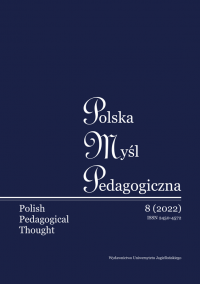O tragizmie cnoty zadufanej. Analiza estetyczno-etycznych aspektów pedagogiki tragicznej Henryka Elzenberga cz. I
The Tragedy of Self-Righteous Virtue: Analysis of the Aesthetic and Ethical Aspects of Henryk Elzenberg’s Tragic Pedagogy. Part I
Author(s): Tomasz DrewniakSubject(s): Philosophy, Aesthetics, History of Education, Pedagogy
Published by: Wydawnictwo Uniwersytetu Jagiellońskiego
Keywords: axiocentrism; culture; objective values; evil; Caesar; Cassius
Summary/Abstract: Suffering is an inalienable aspect of human existence. It requires, firstly, an explanation and, secondly, an assimilation, in which religion and art play special role. In Greek religion and tragedy, attention was paid to the educational role of suffering, which was expressed by the formula pathei mathos (“learn through suffering”), and in Judaism and Christianity it was one of the means used in shaping man by divine justice. In Henryk Elzenberg’s axiocentrism, suffering is a correlate of crossing the sphere of relative values (hedonistic and utilitarian) and the realization of objective values. The first part of the article presents an analysis of Elzenberg’s reflections on the culture-creating role of tragedy, focusing on the interpretation of Shakespeare’s Julius Caesar, which is also a critique of the rationalist educational model. Brutus, who appears as the embodiment of moral qualities, the model of the stoic sage and the republican, on the other hand is characterized by detachment from life, emotional coldness, axiological blindness and passivity, which cause him to destroy those he loves and what he loves.
Journal: Polska Myśl Pedagogiczna
- Issue Year: 8/2022
- Issue No: 8
- Page Range: 259-276
- Page Count: 18
- Language: Polish

